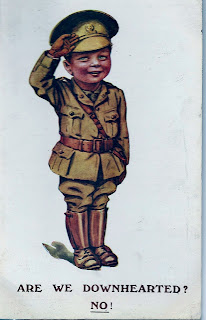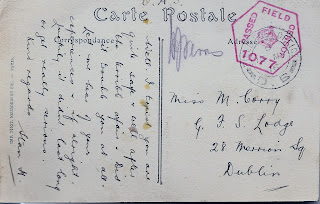My grandmother Maie Corry was an enthusiastic collector of post cards all her life and as a young women she kept them in an album, from which I have taken these dating from 1915 and 1916. The one above, obviously bought by or given to Maie as it has no message, is my favourite because of the beautiful calligraphy and the sense of period - this was the era of the women's suffrage campaign, the romantic enthusiasm for all things Celtic that fulled the Easter Rising, and art nouveau, as well as being in the middle of the First World War ...
At first glance the boyish green-clad figure reminded me of Robin Hood, but she's actually a woman. It was only after looking more closely that I noticed the entwined initials above 'Motto 1916': YWCA for Young Women's Christian Association, whose Waterford hostel Maie lived in for several years while working in Gorman's chemist's shop.
It's hard to make out the dates on some of the cards that Maie received through the post but I think this selection is in chronological order. The first was sent to Maie in Dublin from her mother in Letterkenny, Donegal - probably just to amuse her as there is no message, just the initial 'M', but it might have been a prompt to write home!
Maie's brother Samuel Boyd Corry seems to have enlisted in the 9th Battalion of the Inniskilling Fusiliers in 1915 or possibly 1914 - certainly he was serving as a Corporal in France by October 1915 according to the British Army Service Rolls for 1914-18. This is a postcard which he sent to Maie from Boulogne, but it isn't stamped so must have been sent with a letter.
Several of these postcards come from serving soldiers whose identities are difficult to trace. Some are clearly English, so how Maie would have made friends with them it's difficult to tell - they must have been serving in Ireland at some point. Others may be old friends from Derry serving in English rather than Irish regiments. This one is from a Wm (or W M) Burgon, with whom I can find no connection:
On 19 March 'G' sent this, which seems to be from a field post office near Poperinghe in Belgium - the location has been cut off, but I've found an identical image online. Poperinghe is in Flanders, a few miles from Ypres. The message says 'Forgive tardiness in writing to you, but we have been moving about & haven't really become settled yet. I shall make an honest endeavour soon. KR. G'. A later card in the same handwriting is signed 'K.R. G Murray'.
Then there's a card sent from Boston, Massachusetts on 24 March 1916. In this case the signature has been cut off, but in Maie's Londonderry diaries for 1909 she describes a very sad parting with her best closest friend from Letterkenny, Bessie Scott, who has emigrated to America - this may well be from her. Maie has evidently sent some shamrocks from home to the writer for St Patrick's Day, and the card reads 'Many thanks for shamrocks - a friend of mine here is endeavouring to have them grow. They arrived in good condition still moist. Trust you are all well. Thought you might like this card. Kind regards to ...'
There are three cards in Maie's collection from 'Stan H' - the first, with its poignant message 'I leave again tonight' was sent on 10 April 1916 from South Shields, Tyneside, to the YWCA in Waterford, and forwarded to Maie in Dublin.
On 22 April, just a few days before the Rising, a friend in Waterford 'N. Brown' sent this card when to wish Maie a Happy Easter. 'We expected Will over but he is in hospital with tonsillitis so we are going to Dublin for the day Monday. Love N. Brown' reads the message. I wonder what sort of day they had on Easter Monday 1916 - little did they know what was about to face the British army from an unexpected enemy at home.
On 15 May Stan H wrote from Flanders to express his concern about what had been happening in Dublin, choosing this card which shows the destruction of the medieval cloth hall in Ypres (with the identifying location rather incompetently blacked out!). 'Well I trust you are quite safe and well after the terrible afair,' Stan writes. 'Did it trouble you at all. Let me hear of your experiences & if alright. Luckily it didn't last long or get really serious.' Considering that by this time long stretches of Sackville Street, Abbey Street and the Quays in Dublin were in a similar state of ruin to the centre of Ypres, Maie may well have thought differently about the Irish situation not getting 'really serious', though in comparison to what was happening in France and Belgium the casualty lists were short.
Finally, in this sequence, there's a card sent by an unknown friend from Renfrew in Scotland in June 1916.














No comments:
Post a Comment